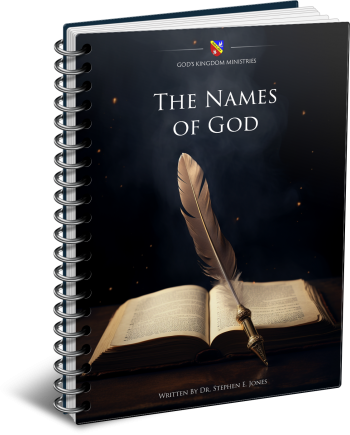Latest Posts
View the latest posts in an easy-to-read list format, with filtering options.

God has revealed His primary name as Jehovah (or Yahweh). But there are 12 variations of Jehovah that reveal specific aspects of His nature so that we can get to know Him.
Category - General

The name, Jehovah-Elyon appears three times in Scripture: Psalms 7:17, 47:2, and 97:9. This is in addition to a similar form of the name found in Gen. 14:18,
18 And Melchizedek, king of Salem, brought out bread and wine; now he was a priest of God Most High [El-Elyon].
El-Elyon uses the title El instead of Jehovah, but we know that it is the same God. The difference draws our attention to different aspects of His nature. El presents Him as the Creator of the earth; Jehovah presents Him as the Covenanter.
The term Elyon itself appears 36 times in the Old Testament, along with 13 appearances in the New Testament (using the Greek word hypsistos). In the NASB the word is translated “Most High” 9 times and “Highest” 4 times. Altogether, the Most High is referenced 49 times in Scripture, which is a number associated with the Jubilee.
Of interest is the fact that the Old Testament uses Elyon 36 times, which is the biblical number of adversary or enemy. Under the Old Covenant—and because of our sin—He turned out to be our enemy (Isaiah 63:10), a problem that was resolved through the New Covenant, where the number is increased to 49 (Jubilee).
Psalm 7:17 says,
17 I will give thanks to the Lord according to His righteousness and will sing praise to the name of the Lord Most High [Jehovah-Elyon].
Psalm 7 is part of the Genesis book of Psalms, which includes the first 41 psalms. Each psalm is like a hymn of praise relating to a different story in the book of Genesis. Psalm 1 speaks of Adam in the Garden. Psalm 2 speaks of Cain murdering Abel, the first martyr. Psalm 3-6 speak of the rise of the wicked and their persecution of the righteous, even while Abel’s blood yet speaks from the ground (Gen. 4:10; Heb. 11:4).
Psalm 7, then, commemorates the flood, which judges the wicked and cleanses the earth before we see the renewed earth in Psalm 8, where all things have been put under His feet. In that context, Psalm 7 ends with a reference to Jehovah-Elyon and “His righteousness” in all of His judgments.
Psalm 47:2-4 clarifies the meaning of Jehovah-Elyon, saying,
2 For the Lord Most High [Jehovah-Elyon] is to be feared [respected, recognizing His right to rule], a great King over all the earth. 3 He subdues peoples under us and nations under our feet. 4 He chooses our inheritance for us, the glory of Jacob whom He loves. Selah.
Jehovah-Elyon is “a great King over all the earth.” As we see in Psalm 7, which describes the flood, “He subdues peoples,” the result being that “You have put all things under his feet” (Psalm 8:6). Adam was given the authority to “subdue” the earth (Gen. 1:28), and Paul says that “He is able even to subdue all things unto Himself” (Phil. 3:21, KJV).
The third use of the name Jehovah-Elyon is found in Psalm 97:9,
9 For You are the Lord Most High [Jehovah-Elyon] over all the earth; You are exalted above all gods.
Here David recognized God’s right to rule the whole earth. In other words, he “feared” God, as we saw in Psalm 47:2. By using the name Jehovah-Elyon, David used the title to depict God as the King over all that He created.
The remarkable thing is that while creation as a whole is subdued under the feet of Christ, our inheritance is to see peoples and nations subdued “under our feet” as well (Psalm 47:3). This is the glory of God. So Paul says in Phil. 3:20, KJV,
20 … we look for the Saviour, the Lord Jesus Christ, 21 who shall change our vile body, that it may be fashioned like unto His glorious body, according to the working, whereby He is able even to subdue all things unto Himself.
In other words, our bodies will be “like unto His glorious body,” so that when all things are subdued under the feet of Christ, those same things will be subject to those who are part of His body. That is why Paul says, “And the God of peace shall bruise Satan under your feet shortly” (Rom. 16:20). This is our inheritance, for we are “fellow heirs with Christ” (Rom. 8:17) through whom we are in covenant with Jehovah-Elyon.
To actually receive this inheritance, we must receive this glory of God in our bodies. Paul calls it “the redemption of our body” (Rom. 8:23). We must be changed into His likeness so that this authority over the nations is not abused. We must be qualified to “reign with Him” (Rev. 20:6).
The first step toward qualifying is justification by faith through the feast of Passover. Many think that justification alone qualifies a believer to reign with Christ, but that is not the case. The second requirement is sanctification through Pentecost, which involves enduring to the end (Heb. 10:36).
Yet not every Pentecostal is qualified to rule. We see, for example, how King Saul was a Pentecostal (1 Sam. 10:6), who was given opportunity to rule. But in spite of his awesome Pentecostal experience, he did not endure to the end but fell into lawlessness and rebellion. For this reason, he lost the throne (1 Sam. 13:13, 14; 15:23, 26) and was replaced by “a man after His own heart” (1 Sam. 13:14).
The overcomers are those who endure to the end, so that they qualify for the third great feast, Sukkoth, “Tabernacles,” through which they receive their inheritance.
Jesus was begotten when the Most High God overshadowed Mary (Luke 1:35), “and for that reason the holy Child shall be called the Son of God.” In other words, the King of Creation had a Son named Jesus, who, as the Son of Elyon, was “the Heir of all things” (Heb. 1:2).
We too are sons of Elyon, if indeed we are begotten by the Spirit of the same God that begat Jesus Christ. Jesus said in Luke 6:35,
35 But love your enemies, and do good, and lend, expecting nothing in return; and your reward will be great, and you will be sons of the Most High [hypsistos]; for He Himself is kind to ungrateful and evil men.
Jesus was telling His disciples that the evidence of being a “son” is to do what his Father does and to manifest the character of his Father. In this case, we are to have the nature of Elyon, not only later when we are transformed fully into His image, but also here and now, even if we are not yet fully successful.
Psalm 7, where we see the first reference to Jehovah-Elyon, is one of three Gittith psalms, along with Psalm 80 and 83. At the end of Psalm 7:17, we read, “To the chief Musician, upon Gittith.” Unfortunately, most translations incorrectly put this as the header for Psalm 8. Dr. Bullinger shows that Psalm 7 is the Gittith psalm, not Psalm 8. The same holds true for Psalm 80 and 83.
Gittith literally means “winepresses.” The Gittith psalms were to be read at the feast of Tabernacles when they poured out the new wine for seven days. The Day of Atonement was specifically the day of vintage for the winepresses, as they extracted the new wine to pour out at the feast of Tabernacles 5 days later.
The point is that the first Gittith psalm mentions Jehovah-Elyon for the first time in Scripture (Psalm 7:17). Pouring out the seven bowls of wine at the feast of Tabernacles is likewise pictured in Revelation 16 in the context of judgment upon Mystery Babylon.
Simultaneously, the wine pictures the new wine of the Spirit being poured out upon those who are able to contain it. One must have new wineskins. Jesus said in Luke 5:37, 38,
37 And no one puts new wine into old wineskins; otherwise the new wine will burst the skins and it will be spilled out, and the skins will be ruined. 38 But new wine must be put into fresh wineskins.
New wineskins speak of those who are able to receive the “wine” of the feast of Tabernacles. Those who have not endured to the end remain as “old wineskins” who are not qualified for the fullness of the Spirit and the bodily change that is the inheritance of the sons of Elyon.
So we see a dual fulfillment of that which is prophesied in the feast of Tabernacles. There is judgment for those who are disqualified; while “the glory of Jacob” (Psalm 47:4) is the inheritance of those “whom He loves.” The reference to Jacob is to remind us of the night Jacob wrestled with the angel Peniel, at which time he received the new name, Israel (Gen. 32:28).
Names indicate one’s nature. Hence, Jacob’s nature was changed from being a supplanter (deceiver or usurper) to one who reverenced God’s right to rule. Israel means “God rules,” and as sons of the Most High God, we are called to rule with Him by the authority of Jesus Christ.
In the sequence of Jacob’s journey to Padan-aram and back, he fulfilled all of the feast days that were later established in Israel’s wilderness journey from Egypt to the Promised Land. When he wrestled with the angel—just before going to Sukkoth the next day—he fulfilled the prophecy of the Day of Atonement. This is where he received the name Israel, and eventually, this same day became the preparation day for the feast of Tabernacles.
Here the new wine was extracted for the celebration of Tabernacles. So it is fitting that Psalm 7 would be for Gittith and that this is the first mention of Jehovah-Elyon, the Most High God, who is ready to give the sons of God their inheritance.
In the psalms, we are given three examples of prayer to Jehovah-Elyon. These include an understanding of who He is as the great King of the earth (Psalm 47:2), who is “far above all the gods” (Psalm 97:9). When we recognize His rights as the King, we may “give thanks” and “sing praise to the name of the Lord Most High” (Psalm 7:17), because He gives us our inheritance by subduing “peoples and nations under our feet” (Psalm 47:3).
To give thanks is to know that He will indeed fulfill His promise to us, because from His position of absolute power, He is able and willing to glorify us and fill us with the new wine of the Spirit.
Jehovah-Elyon is said specifically to be our heavenly Father. It speaks of His family relationship with us, and this is the basis of our inheritance.